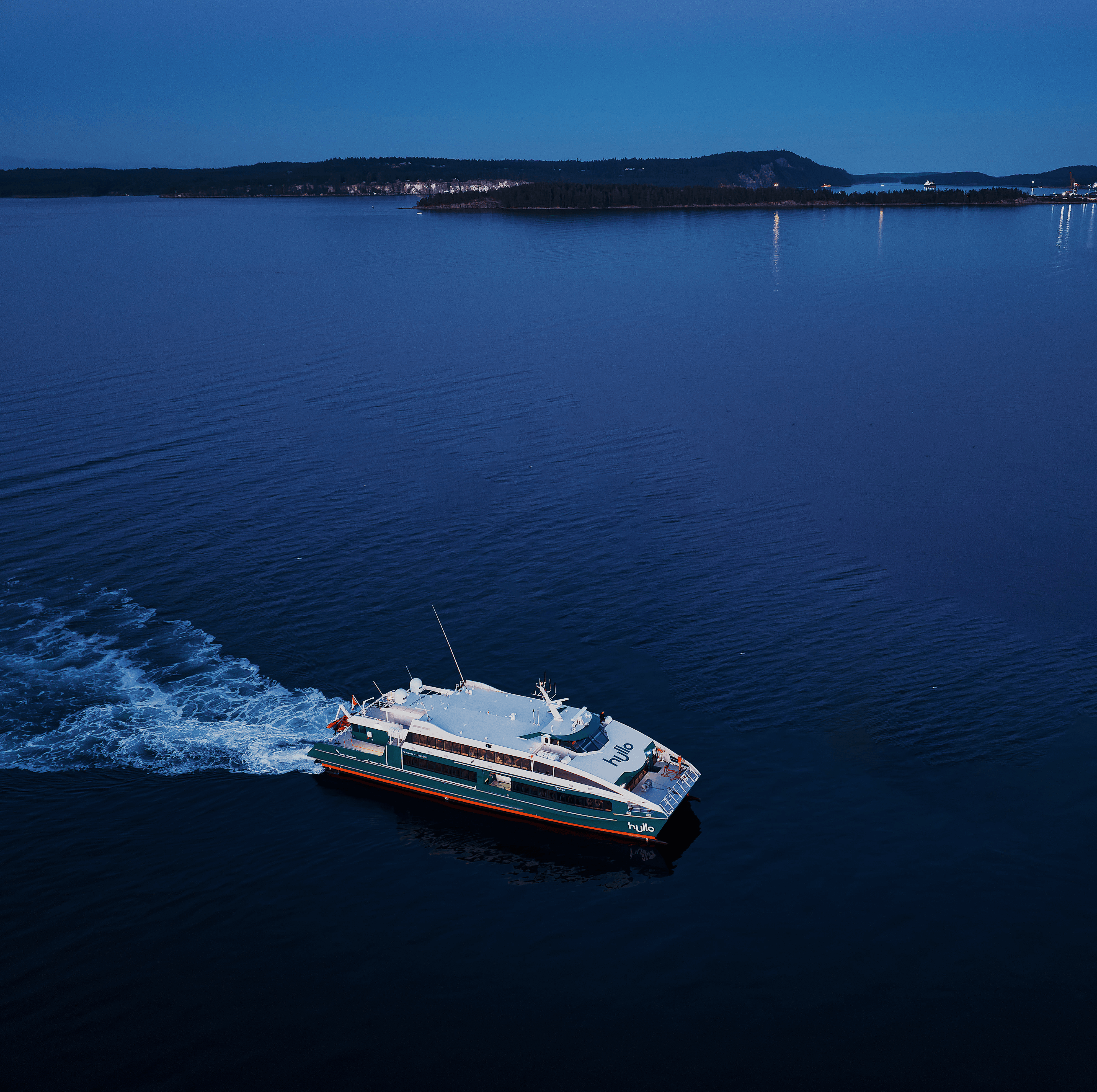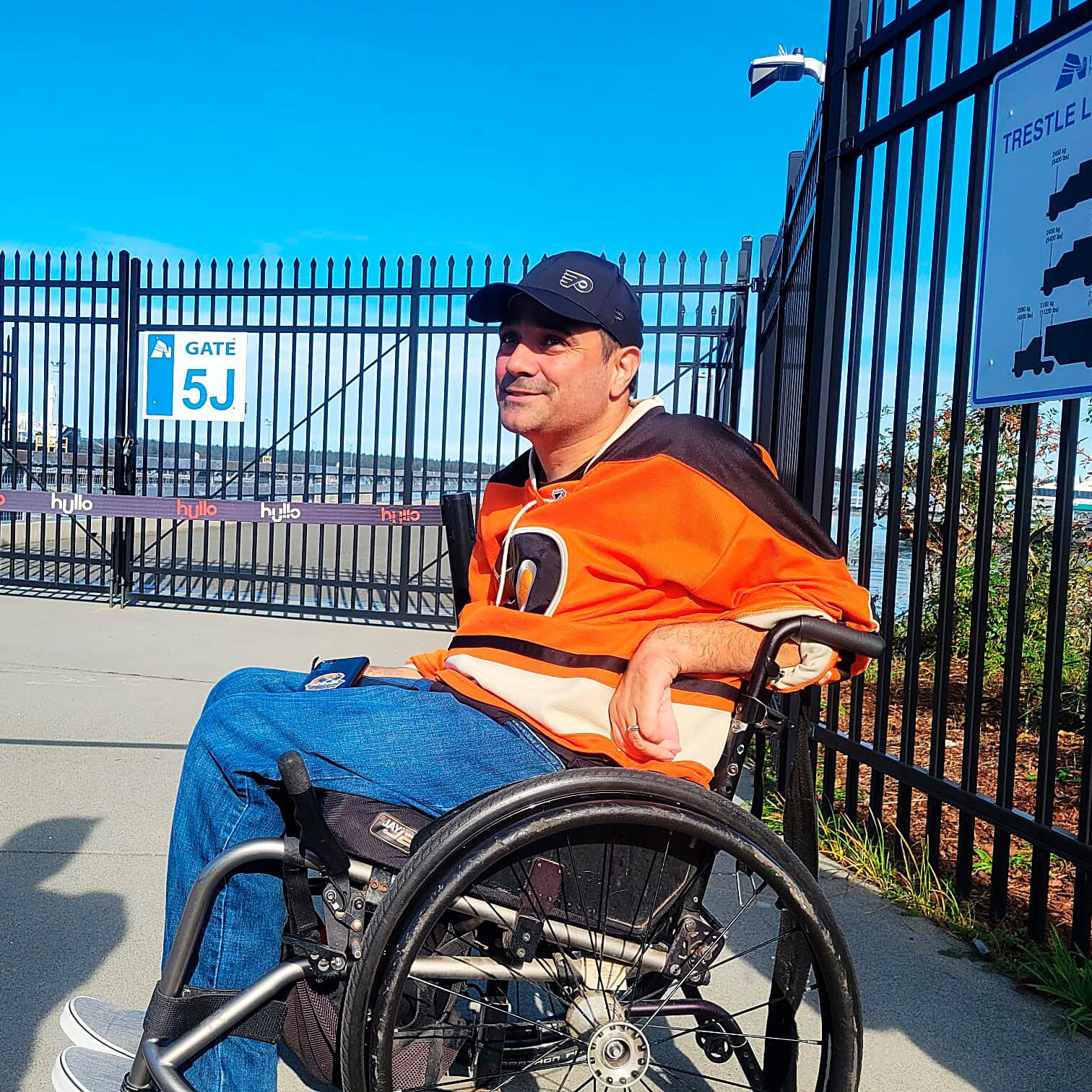
When Hullo Ferries launched their high-speed passenger ferry service between Nanaimo and Vancouver in August 2023, one of their main goals was to be the world’s friendliest ferry service. With an average sailing time of only 70 minutes, two brand new vessels, free Wi-Fi, and ferry terminals located near downtown public transit on either side of the Salish Sea, it appeared Hullo was on track to do just that. However, accessibility concerns were quickly raised by SCI BC peers, staff, and passengers with disabilities.
Jocelyn Maffin, SCI BC’s Associate Director of Service Delivery and local Nanaimo resident, was one of the first wheelchair users to utilize the new ferries. Despite all of the positive aspects of her inaugural Hullo Ferries journey—a fast travel time, helpful staff, and a convenient location—the multitude of accessibility issues could not be ignored. “The ramp over the thresh old into the main cabin was too narrow, and it was really hard to figure out how to get a wheelchair ticket on [the Hullo] website,” she says.

The biggest concern was Hullo’s mandate that all passengers travel in a designated ferry seat. This meant wheelchair users were required to transfer to a seat upon boarding and then transfer back to their wheelchair to disembark. “Because I can transfer, I [was] able to use the service, but I know how many of our peer community members were upset that this brand new option was out of reach for them because of the requirement to transfer to the ferry seat provided,” Maffin says.
Hullo is the first operator in Canada to receive full approval under the High Speed Craft Code and must adhere to stringent safety standards that exceed those of the other operators, such as BC Ferries and the Victoria Clipper. Being the first of its kind, Hullo proactively engaged with Transport Canada and Bureau Veritas to try and provide the best safety and service for all passengers, but guidelines were either not always clear or restrictive. The requirement for all wheelchair users to move to a fixed seat during the voyage is a particularly challenging example.
“One of the most important things to remember is that because we travel at 40 knots, we have a completely different designation than other ferry systems in Canada… there are no vehicles, no outdoor seating or anything like that,” explains Xander France, Director of Marketing and Sales at Hullo Ferries.“ Because our chairs on board were rated by Transport Canada as the safest option, we had to work within those guidelines. But as [SCI BC] knows, that’s not an option for everyone.”

Hullo responded to ongoing accessibility challenges by working within the policy they were given. They discounted ticket prices for wheelchair users travelling with a companion, installed a wider boarding ramp, and removed some of the interior tables for additional transfer space, but it didn’t address the issue at the heart of the matter. Moreover, due to Transport Canada policy, Hullo Ferries didn’t allow power wheelchairs on board because of concerns related to transporting lithium ion batteries. “[Power wheelchair] users already face some of the biggest barriers to transportation like expensive modified vehicles and a lack of options,” says Maffin. “Most people I know with power wheelchairs are safer in their own custom seating than in the airline-style seating on Hullo’s ferries, let alone transferring… Hullo [didn’t] require reserved seating for non-disabled passengers or force them to remain in their seats during the whole 70-minute journey, so why is that the case for wheelchair users?”
By the fall of 2023, it was clear a new approach was needed to address accessibility. Maffin contacted Canada’s Chief Accessibility Officer and former SCI BC employee, Stephanie Cadieux, for help. Together, they reached out to Transport Canada and were told that many of the issues brought forward were at the discretion of the ship’s captain. However, when Hullo Ferries’ Captain Steven Carroll submitted a case to Transport Canada with passenger feedback, they received a reply reiterating the formal policy. Faced with a bureaucratic stalemate, efforts pivoted once again and looked to the SCI BC community for support.

In November 2023, a group of three SCI BC peers took part in a trial journey with newly installed tie-down straps for power wheelchairs. “Through [Maffin’s] connections, we looked at some options on the Island and went with Mediquip. We were able to get our team to install the right restraints and the right tie-downs and… with that in place, we were able to get approval to try power wheelchairs,” explains France.
As of March 2024, Hullo officially allowed power wheelchairs on board with the use of a tie-down system. Unfortunately, this small victory was overshadowed by the remaining fact that passengers still had to transfer out of their chairs—manual or power—into a ferry seat.
“I would’ve complied if there was some common sense to it, but there was none,” says Jamie Coleman, SCI BC peer and Duncan resident. Coleman first used Hullo Ferries in 2023 and had no issues. He wasn’t asked to transfer and completed his trip in his own wheelchair. In May 2024, though, Coleman was about to get on the ferry to Vancouver but was told he would have to transfer. “They said I had to get out of my chair, and if not, I couldn’t get on the boat,” says Coleman. “I said, ‘Well, I can’t get out by myself, and I can’t self-transfer.’ I was with my wife, and while she can physically get me from chair to chair if she really has to, it’s a huge pain. At the end of the day, she managed to do it and we made it happen, but it was hard on her and embarrassing for me.”

Coleman still isn’t sure why the transfer policy was enforced on his second voyage and not his first, but the incident left him feeling frustrated and upset. “I’m much safer in my wheelchair,” he says. “I have a [C5/C6] injury, and when they got me into the seat I wasn’t stable. I have no function higher up, so I’m more dangerous in their chair compared to my own. Also, once they got me into a fixed chair, they tied down my wheelchair—so really, why don’t you just let me sit in it?”
After his experience, Coleman immediately filed a human rights complaint and wrote to his MP, his local MLA, the CEO of Hullo Ferries, and several disability organizations, including SCI BC. As a practising lawyer, Coleman felt his professional skills could be put to use for the benefit of others. “I don’t consider myself to be an advocate. I’m a quadriplegic lawyer with twins. I’m busy with a bunch of my own stuff and I don’t always have time for other things, but this issue really resonated with me, and I knew I had the tools to push the envelope a bit.”
Hullo supported Coleman’s initiative and encouraged him to communicate with the Ministry of Transport and Transport Canada. Coleman’s MP wrote to the Minister of Transportation directly and the media was contacted to help amplify the call to action. “It’s stressful when you’re up against regulations that are clear in saying you can’t do anything about them, but we all knew how important this was,” France says. “With the larger group coming together, it was really quite impressive for us all to push to make this happen.”
Ultimately, the combination of Coleman’s advocacy, pressure from community members and disability organizations, media coverage, and Hullo’s reception to change led to a positive outcome. “Jamie was one of the biggest champions… we were able to get an exemption to the High Speed Craft Code that [allowed] guests to stay in their wheelchair,” says France. Transport Canada and the Marine Technical Review Board granted the exemption, confirming that Hullo’s improved safety measures exceeded the requirements of the Code and effectively ensured passenger safety.
In October 2024, Coleman was the first passenger to officially travel in their wheelchair aboard Hullo Ferries and test out the new process. “This time, I went with my son and everything aligned. We went over to Vancouver for a hockey game and everything was fine,” he says. More than a year after launching, Transport Canada granted a continuing exemption to Hullo Ferries that allows wheelchair users to remain in their chairs for the duration of their trip. The updated policy went into full effect by the end of 2024 and Hullo passengers can now expect this standard to be upheld, along with a number of other adjustments to service.

“We now have a dedicated booking flow and an accessibility landing page on our website with information for passengers. When you arrive at the terminal, it’s also noted on that sailing if there’s someone travelling that needs extra assistance and our staff has been trained on how to support individuals,” says France. Going forward, Coleman hopes that accessibility will be a priority and that concerns will be responded to with sincerity and attention. “This was clearly a discriminatory case and a justice issue. I try to let common sense prevail, but in this situation, there was no common sense to begin with. [The regulation] didn’t make things safer for anyone and it wasn’t beneficial,” he says. “In the end, I’m glad the red tape wasn’t too thick to stop us—but that needs to change.”
This article was originally published in the Spring 2025 issue of The Spin. Read more stories from this issue, including:
- Breastfeeding
- Disability worker rights
- Next gen clinical trials,
And more!




